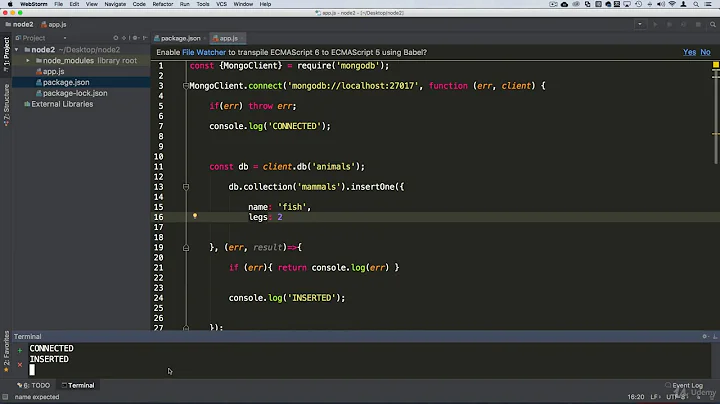How can I generate an ObjectId with mongoose?
Solution 1
You can find the ObjectId constructor on require('mongoose').Types. Here is an example:
var mongoose = require('mongoose');
var id = mongoose.Types.ObjectId();
id is a newly generated ObjectId.
Note: As Joshua Sherman points out, with Mongoose 6 you must prefix the call with new:
var id = new mongoose.Types.ObjectId();
You can read more about the Types object at Mongoose#Types documentation.
Solution 2
You can create a new MongoDB ObjectId like this using mongoose:
var mongoose = require('mongoose');
var newId = new mongoose.mongo.ObjectId('56cb91bdc3464f14678934ca');
// or leave the id string blank to generate an id with a new hex identifier
var newId2 = new mongoose.mongo.ObjectId();
Solution 3
I needed to generate mongodb ids on client side.
After digging into the mongodb source code i found they generate ObjectIDs using npm bson lib.
If ever you need only to generate an ObjectID without installing the whole mongodb / mongoose package, you can import the lighter bson library :
const bson = require('bson');
new bson.ObjectId(); // 5cabe64dcf0d4447fa60f5e2
Note: There is also an npm project named bson-objectid being even lighter
Solution 4
With ES6 syntax
import mongoose from "mongoose";
// Generate a new new ObjectId
const newId2 = new mongoose.Types.ObjectId();
// Convert string to ObjectId
const newId = new mongoose.Types.ObjectId('56cb91bdc3464f14678934ca');
Related videos on Youtube
Dmitry Minkovsky
Updated on September 10, 2021Comments
-
 Dmitry Minkovsky over 2 years
Dmitry Minkovsky over 2 yearsI'd like to generate a MongoDB
ObjectIdwith Mongoose. Is there a way to access theObjectIdconstructor from Mongoose?This question is about generating a new
ObjectIdfrom scratch. The generated ID is a brand new universally unique ID.Another question asks about creating an
ObjectIdfrom an existing string representation. In this case, you already have a string representation of an ID—it may or may not be universally unique—and you are parsing it into anObjectId.
-
 R01010010 almost 8 yearshow can you be sure that this is really unique? does mongoose any check before?
R01010010 almost 8 yearshow can you be sure that this is really unique? does mongoose any check before? -
 Dmitry Minkovsky almost 8 years@R01010010 check out how these are generated (Google). There's no check but it's probabilistic
Dmitry Minkovsky almost 8 years@R01010010 check out how these are generated (Google). There's no check but it's probabilistic -
Raja almost 8 yearsIf you generate 16777216 within one second on the same machine, then you will probably get a duplicate. :)
-
 Evading Shadows almost 4 yearsCorrection: If you generate 16777216 within one millisecond on the same machine, then you will probably get a duplicate. 😁
Evading Shadows almost 4 yearsCorrection: If you generate 16777216 within one millisecond on the same machine, then you will probably get a duplicate. 😁 -
 Saahithyan Vigneswaran about 3 years@joeytwiddle what is this number 16777216 ?
Saahithyan Vigneswaran about 3 years@joeytwiddle what is this number 16777216 ? -
 Dmitry Minkovsky about 3 years@SaahithyanVigneswaran it's 2^24, supposing you are using 24 bits for the random portion of the ID
Dmitry Minkovsky about 3 years@SaahithyanVigneswaran it's 2^24, supposing you are using 24 bits for the random portion of the ID -
Raja about 3 yearsHow are MongoDB's ObjectIds generated? The local counter is three bytes, or six hex chars. We can calculate:
256 ** 3 === 16 ** 6 === 16777216 -
 Joshua Sherman over 2 yearslooks like with mongoose 6 you have to add new
Joshua Sherman over 2 yearslooks like with mongoose 6 you have to add newnew mongoose.Types.ObjectId() -
 Dmitry Minkovsky over 2 yearsThank you @JoshuaSherman. I updated the answer.
Dmitry Minkovsky over 2 yearsThank you @JoshuaSherman. I updated the answer. -
MartianMartian about 2 yearswhat's the diff between mongoose.Type and mongoose.Schema.Types ?
-
 stefano about 2 yearsmongoose.Schema.Types will be used to within your schema when you want to reference between collections. To create a single objectId within your code use simply mongoose.Types
stefano about 2 yearsmongoose.Schema.Types will be used to within your schema when you want to reference between collections. To create a single objectId within your code use simply mongoose.Types






![ObjectId in MongoDB | Use of ObjectId [Mongo DB]](https://i.ytimg.com/vi/D-B0o64Odck/hq720.jpg?sqp=-oaymwEcCNAFEJQDSFXyq4qpAw4IARUAAIhCGAFwAcABBg==&rs=AOn4CLCZsDw0Baiw76yTP_stRb9JixFHTg)